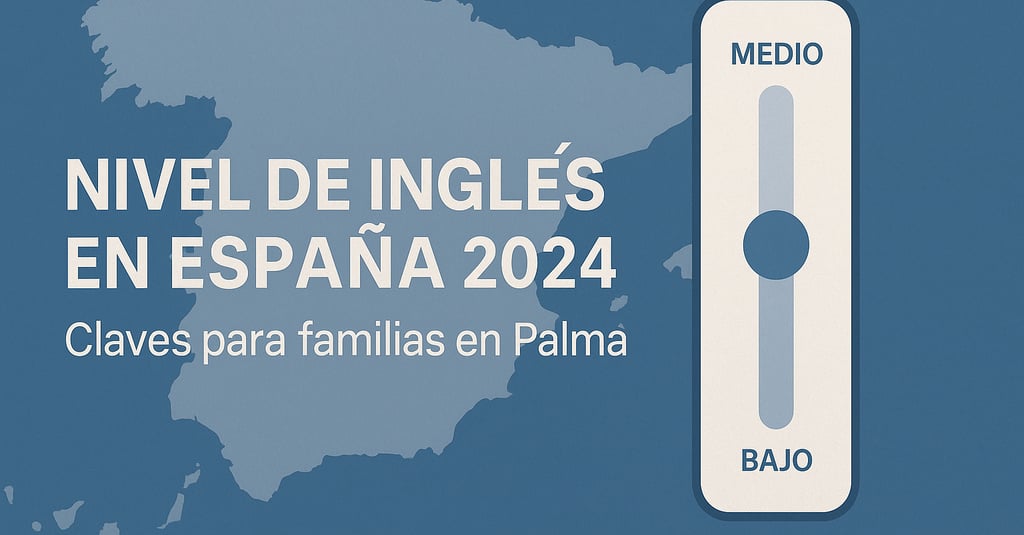Why Does Spain Still Rank “Moderate” in English According to EF EPI 2024? What It Means for Families in Palma de Mallorca
Spain ranks “moderate” in English in EF EPI 2024. Discover what this means for families in Palma de Mallorca and how to improve locally.
ENGLISH LEARNINGBLOG IN ENGLISH
Patrick Nagel
8/18/20252 min read


Why Does Spain Still Rank “Moderate” in English According to EF EPI 2024? What It Means for Families in Palma de Mallorca
Spain has much to gain from English. Yet, the latest EF English Proficiency Index (EF EPI) 2024 shows that our country remains at a “moderate” level, far behind Northern Europe.
According to the international ranking, Spain is placed 36th out of 116 countries, with a score of 538. This puts us in the “moderate proficiency” band, below the European average.
But what does this mean for families in Palma de Mallorca—especially in neighbourhoods like Son Cotoner? How does it affect the future of children, and what can be done locally to improve?
Spain’s Position in EF EPI 2024
The EF EPI is a global study that measures the English level of adults worldwide. In the 2024 edition:
Spain remains in the middle band, with no major improvement compared to previous years.
Countries like the Netherlands, Austria, and Denmark lead the ranking with “very high” levels.
Regionally, some communities such as Galicia have improved, while others, like the Balearic Islands, remain stagnant.
The Barriers Holding Back English in Spain
Traditional Teaching Methods
For decades, English teaching in schools has focused heavily on grammar rules and memorisation. The result: students who can pass exams but struggle to communicate fluently in real life.
Dubbing and Limited Exposure to Real English
Spain is one of the countries where films and TV shows are most frequently dubbed. Unlike in Northern Europe, children here grow up with less natural exposure to spoken English, which limits listening skills and authentic pronunciation.
Lack of Everyday Practice
English is often seen as just another school subject, not as a daily communication tool. Outside the classroom, opportunities to practise are scarce.
What Does This Mean for Families in Palma?
For parents in Palma de Mallorca, these national challenges are felt directly in their children’s education.
In neighbourhoods like Son Cotoner, many families wonder how to ensure their children don’t just “pass English” in school but actually use it as a real key for their academic and professional futures.
How to Improve Children’s English in Mallorca
Breaking past the “moderate” level doesn’t depend only on national strategies—it starts locally. For children in Palma, some key approaches include:
Practical, communicative methods: learning English through games, songs, theatre, and conversation.
Immersive environments: activities where English is the main language, even in informal settings.
Authentic materials: books, series, and music in English from an early age.
Innovative Methods in Local Academies
More and more academies in Palma are moving away from the traditional model and adopting innovative methods. These put the focus on communication and motivation:
Teachers act as guides, not just instructors.
Classes are participatory, with children speaking and using English actively.
Artistic activities—music, theatre, drawing—integrate English naturally into the learning process.
This shift is essential if children in Palma are to move beyond the “moderate” band and achieve real fluency.
Conclusion
Spain’s English level in EF EPI 2024 highlights a challenge: while other European countries advance, we remain stuck in “moderate proficiency.”
But change doesn’t have to wait for national reforms. In Palma de Mallorca, families can take the lead by choosing more communicative and modern approaches for their children.
👉 The future of English in Spain begins locally—in neighbourhoods like Son Cotoner—where every innovative English class opens new opportunities for children.
PAUPA
International Academy
Modern, joyful learning for all ages at Paupa.
Contact
Newsletter (Blog)
hello@paupa.org
613 026 664
© 2021-2025. All rights reserved.
